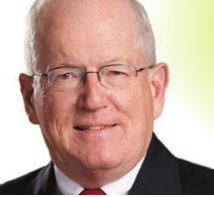Michael Delaney’s experience exposes a troubling U.S. Senate judicial nomination system
Michael Delaney is a fine attorney, a fine man and an involved citizen. He is an exemplary family man. When he was nominated to be a judge on the First Circuit Court of Appeals, the first reaction of most people who know him was what an outstanding nomination it was, better than many others.
Imagine the concern and dismay those who know Delaney experienced when his nomination ran into partisan crossfire and grandstanding, when it reached the Senate Judiciary Committee, notwithstanding his enthusiastic support from New Hampshire’s two senators, Jeanne Shaheen and Maggie Hassan. This became even worse when Delaney’s nomination was stalled due to the illness of California Sen. Diane Feinstein, whose absence stalled committee votes on nominees.
The process got off the rails when Delaney withdrew his name from nomination after the committee refused to vote on it, apparently on the basis of advice that he did not have the votes for confirmation.
What does this say about the integrity of the process? After his nomination, Delaney was criticized primarily for two parts of his history practicing law.
First, when he was an assistant attorney general, he apparently was responsible for taking positions now deemed to be wrong on one side of politics or another. Criticizing an attorney in an office headed by a political appointee who makes the policy decisions is, in effect, criticizing the attorney for doing his job effectively.
Second, Delaney was criticized for zealously representing a client, St. Paul’s School, in a case alleging sexual assault, in which the plaintiff apparently was trying the case in the press, and, in fact, later wrote a book about it. Delaney and the team of attorneys representing St. Paul’s responded in kind once the case had begun to be tried in the press. Again, as a private attorney, he was doing his job, and doing it well.
All this discounts his service and accomplishments as counsel to New Hampshire’s governor and as attorney general, which he performed admirably, while in charge of setting policy, setting many policies that advanced the rights of those formerly discriminated against.
Those who know Mike Delaney well know him to be a fine man and citizen.
As a resident of Manchester, he has kept his children in the Manchester school system, recognizing that it needs students from all backgrounds, and they have done well. In the process, he has been involved in efforts to support and improve schools so other professionals will not only work in the city but live in Manchester and keep their children in its schools. He has been involved in many civic activities, in all of which he has earned the respect of those who work with him.
What does this spectacle say about the nomination process?
Unfortunately, it seems to say that those who have done their jobs well and faced difficult situations can have those records dissected and misrepresented, and with rumor and innuendo left hanging, can be rejected for further public service, since the confirming body is so timid or intimidated by accusations that it will not research the facts properly and sort out the wheat and the chaff.
Perhaps more importantly, where this leaves us all in the confirmation and appointment process is that only those with no record of important representations or participation in controversial matters will be acceptable nominees, given their ability to avoid controversy. This ignores the fact that those who can be vigorous prosecutors, defense attorneys, private advocates, or proponents of a point of view, will be disqualified for appointment to office since they are presumed to be unable to avoid the point of view they held in one job or another.
This ignores the training attorneys receive to represent client interests. It also ignores the history of many who have been appointed to office and proved to represent the opposite of what they were accused of prior to appointment, such as Felix Frankfurter or Earl Warren on the Supreme Court, who, when appointed by Presidents Franklin Roosevelt and Dwight Eisenhower, respectively, and were expected to be liberal and conservative, respectively, but proved to be the reverse of what was predicted.
Brad Cook is a Manchester attorney. The views expressed in this column are his own. He can be reached at bradfordcook01@gmail.com.